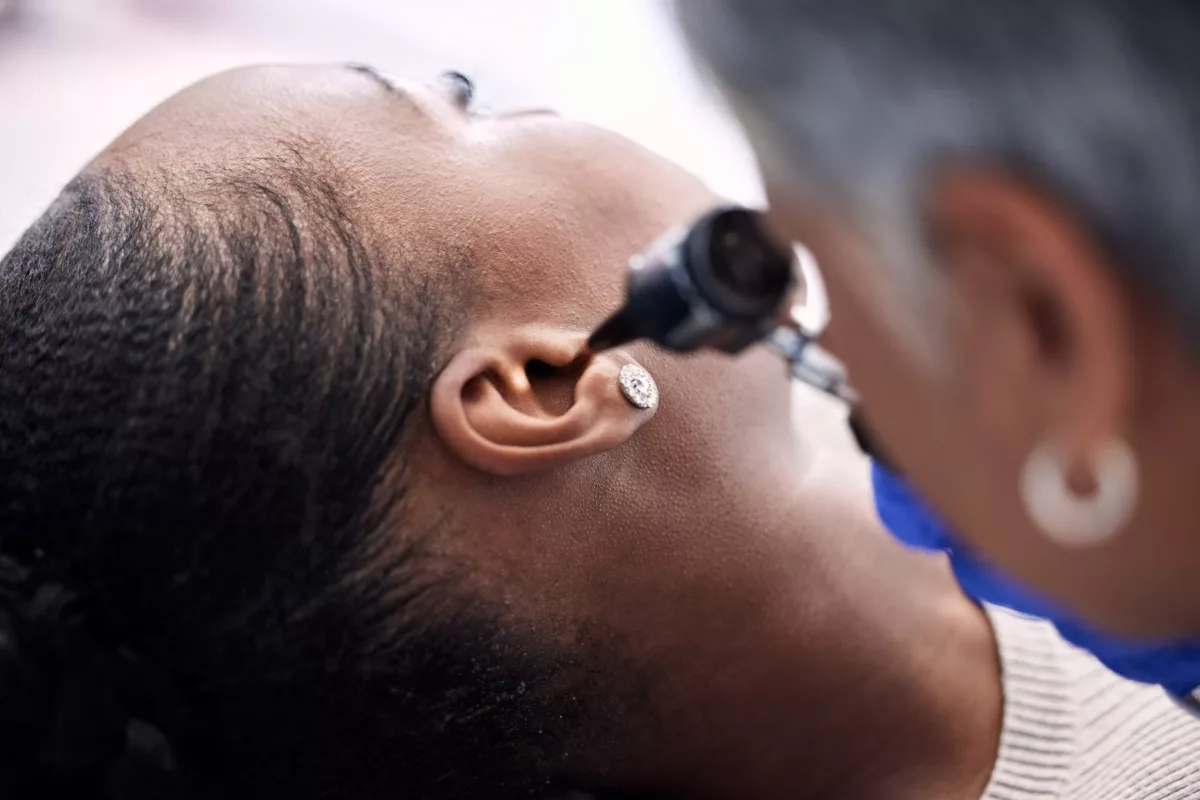Stress on the eardrum that happens when air pressure in the middle ear is out of balance compared to the environment is called airplane ear (also known as ear barotrauma). People usually get this condition when an airplane is climbing after takeoff or descending for landing. Sometimes, this condition is called barotitis media or aerotitis media.
Commonly, the following measures help balance air pressure and improve the symptoms. These include swallowing, yawning, or chewing gum. In severe cases, people with airplane ear need to see a doctor.
Symptoms
This condition may happen in one or both ears and cause the following symptoms. For example:
- Discomfort or pain in the ear
- Stuffiness or fullness in the ear
- Muffled hearing
- Mild to moderate hearing loss
Check some symptoms that may occur in severe cases:
- Severe pain
- Moderate to severe hearing loss
- Increased pressure in the ear
- Tinnitus (ringing in the ears)
- Vertigo
- Bleeding from the ears
If any of the previous symptoms happen and last more than several days, you should see a doctor right away.
Causes
This condition happens when the air pressure in the ear and the environment do not match. It prevents the tympanic membrane (eardrum) from vibrating properly. However, a narrow passage located near the eardrum that helps regulate the air pressure is called the Eustachian tube. However, when an airplane climbs or descends, air pressure changes quickly, and the Eustachian tube usually cannot react fast enough, which leads to symptoms. Yawning or swallowing is shown to open the Eustachian tube, which allows the middle ear to get more air. As a result, it helps equalize air pressure.
This condition may be caused by factors as well. These include:
- Hyperbaric oxygen chambers
- Nearby explosions that occur commonly in a war zone
- Scuba diving
In some cases, people may experience mild symptoms of airplane ear when riding an elevator in tall buildings or driving in the mountains.
Risk Factors
Anything that blocks the Eustachian tube or limits its function elevates the risk of airplane ear. Check below for the most common risk factors:
- Small Eustachian tube (especially in infants or toddlers)
- The common cold
- Sinus infection
- Hay fever (also called allergic rhinitis)
- Otitis media (also known as middle ear infection)
- Sleeping on an airplane during ascent or descent
Complications
Generally, this is not a serious condition and responds well to self-care measures. Airplane ear complications often occur when the disease is serious or prolonged, and it causes damage to the middle or inner ear. In severe cases, people may experience permanent hearing loss or chronic tinnitus.
How to Prevent Airplane Ear?
There are some tips that may help prevent this condition. Examples include:
- Swallow or yawn during climbing or descending – This helps activate muscles that help keep the Eustachian tube open. A chewing gum may also help.
- Valsalva maneuver – This involves blowing the nose while pinching the nostrils and keeping the mouth closed. You should use this maneuver during ascent or descent because it also helps equalize pressure between the airplane cabin and your ears.
- It is not advised to sleep during climbing or descending
- Change travel plans – It is not recommended to fly if you have a cold, sinus infection, nasal congestion, or other ear infections. Discuss with your healthcare professional about when it is safe to travel, especially if you have had ear surgery.
- Over-the-counter (OTC) nasal spray – You can use an OTC nasal spray approximately 30 minutes before takeoff and landing to ease the symptoms.
- Decongestant pills – These are oral medicines that are also used 30 minutes before an airplane climbs or descends. However, you should take these medications carefully and avoid them if you have heart disease (such as arrhythmia), hypertension (high blood pressure), or if you are pregnant.
- Allergy medicines – These medications may help reduce the symptoms if you have allergies. Administer the medicine an hour before the flight.
If you are at increased risk of severe airplane ear and fly frequently or have hyperbaric oxygen therapies to treat other conditions, your doctor may recommend certain tubes that help drain fluid and ventilate the middle ear. These tubes also help to equalize pressure between the outer and middle ear.
Diagnosis
Commonly, doctors perform an ear examination to diagnose this condition. During examination, they often use an otoscope (a lighted instrument that allows the doctor to see inside the ear).
Treatment
In most cases, airplane ear heals itself within a few hours after landing. Treatment is usually needed when the symptoms last more than 2-3 days. Check below for some treatments that doctors often recommend for people with airplane ear:
Medicines
To treat the condition, physicians prescribe decongestant nasal sprays or pills. However, they may also recommend over-the-counter (OTC) pain relievers such as non-steroidal anti-inflammatory drugs (NSAIDs). These include Ibuprofen, Naproxen sodium, or Acetaminophen (an analgesic pain reliever).
Self-care Therapies
Along with medicines, doctors may recommend using the Valsalva maneuver. During this procedure, you should blow your nose while keeping your nostrils and mouth closed. If it does work, repeat it several times.
Surgery
This treatment is rarely recommended by doctors because even a ruptured eardrum or ruptured membranes of the inner ear heal themselves. When surgery is needed, it involves an incision in the eardrum that helps equalize air pressure and drain fluids. This treatment is called myringotomy.
Frequently Asked Questions
How long does airplane ear usually last?
A mild form of airplane ear usually lasts several minutes. When symptoms last more than 2-3 days, you should visit a doctor. In addition, serious damage to the eardrum may take months to heal, and sometimes, surgery is needed to repair the eardrum.
What are airplane ear symptoms?
Commonly, symptoms caused by this condition are mild, but some people may experience the following symptoms. Examples include:
- Hearing problems
- Severe ear pain
- Dizziness
- Fluid oozing from the ear (very rarely), which may indicate a ruptured eardrum
If any of the previous symptoms occur, do not hesitate to see a doctor.
What happens if airplane ear is left untreated?
If you ignore the symptoms and do not get treatment for this condition, it may lead to some complications. These include a ruptured eardrum, prolonged hearing loss, chronic tinnitus, and severe vertigo or dizziness (rarely). Discuss with your healthcare professional ways to prevent airplane ear complications. Ask your doctor if you have any other questions.




